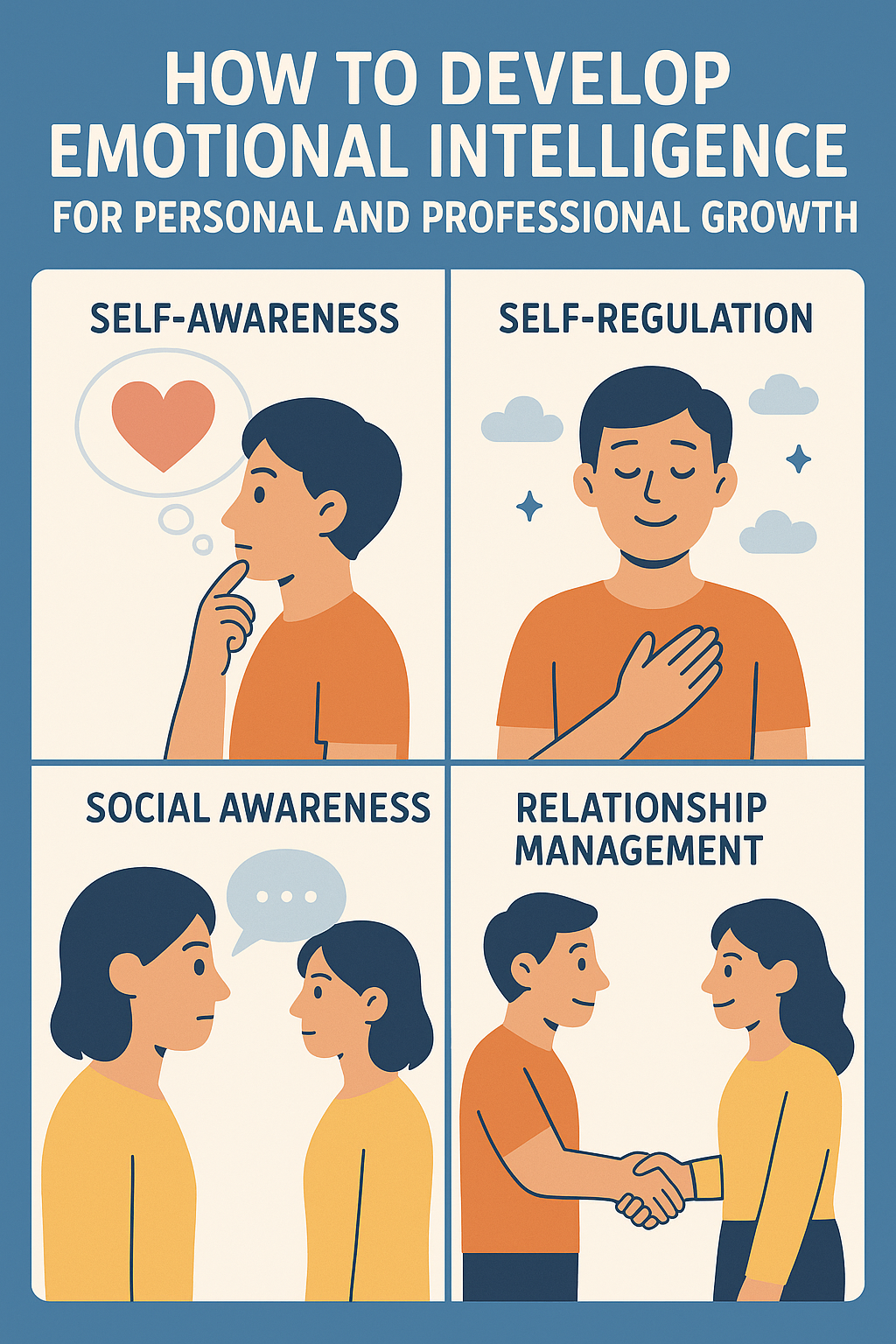Emotional intelligence (EQ) is the ability to recognize, understand, manage, and influence our own emotions and the emotions of others. High emotional intelligence is essential for building strong relationships, managing stress, and improving decision-making. Whether in personal life or the workplace, developing EQ can significantly enhance your ability to connect with others, achieve success, and lead effectively. In this article, we’ll explore practical strategies for developing emotional intelligence and leveraging it for personal and professional growth.
1. Recognize and Understand Your Emotions
The first step in developing emotional intelligence is to become aware of your own emotions. Being able to recognize and understand how you’re feeling allows you to manage your emotional responses and make more thoughtful decisions. Self-awareness is the foundation of emotional intelligence, as it helps you understand the impact of your emotions on your behavior and interactions with others.
Tip: Take time each day to reflect on your emotions. Journal or meditate to help identify what triggers certain feelings and how you can better manage them.
2. Practice Self-Regulation
Self-regulation is the ability to control your emotions, especially in stressful or challenging situations. People with high EQ are able to pause before reacting and think through their responses, avoiding impulsive behavior or negative reactions. This skill is crucial for staying calm under pressure and maintaining productive relationships.
Tip: When you feel a strong emotional reaction, pause before responding. Take a deep breath, count to five, or step away from the situation to collect your thoughts before reacting.
3. Cultivate Empathy
Empathy is the ability to understand and share the feelings of others. It’s a key component of emotional intelligence that allows you to connect with people on a deeper level. Empathy enhances communication and helps build trust, both of which are essential for successful relationships in both personal and professional settings.
Tip: Practice active listening in your conversations. Pay attention to the speaker’s words, tone, and body language. Try to understand their feelings and perspective without interrupting or offering advice right away.
4. Improve Your Social Skills
Strong social skills are an essential aspect of emotional intelligence. These skills help you build positive relationships, resolve conflicts, and communicate effectively. People with high EQ can work well with others, influence others in a positive way, and create a supportive environment in both personal and professional settings.
Tip: Focus on building rapport in your interactions. Practice open communication, active listening, and showing genuine interest in others. Work on developing your ability to navigate social situations and resolve conflicts constructively.
5. Manage Stress Effectively
Stress is a natural part of life, but how we manage it greatly impacts our emotional intelligence. High emotional intelligence enables you to recognize the signs of stress and take proactive steps to manage it. When you can handle stress effectively, you maintain focus, make better decisions, and avoid emotional burnout.
Tip: Practice stress-management techniques such as deep breathing, mindfulness, or exercise. Take regular breaks throughout the day to recharge and prevent stress from affecting your emotional responses.
6. Be Open to Feedback
Being open to feedback is a crucial aspect of emotional intelligence. Feedback helps you gain perspective on your behavior, improve your performance, and identify areas for growth. When you receive feedback with an open mind, you enhance your self-awareness and demonstrate maturity and resilience.
Tip: View feedback as a learning opportunity. Ask for constructive feedback from colleagues, friends, or mentors, and use it as a tool for growth. Respond positively, even when the feedback is difficult to hear.
7. Build Resilience
Emotional intelligence helps you build resilience, the ability to bounce back from setbacks, failures, and challenges. People with high EQ are able to maintain a positive outlook, learn from their mistakes, and persevere in the face of adversity. Resilience is essential for personal growth and professional success.
Tip: When faced with setbacks, focus on the lessons learned rather than the failure itself. Use challenges as opportunities to grow stronger, and remind yourself that every obstacle is temporary.
8. Develop Healthy Emotional Expression
Expressing emotions in a healthy way is an important part of emotional intelligence. Bottling up emotions can lead to stress, resentment, and miscommunication. Being able to express your emotions openly and appropriately allows you to communicate your needs, resolve conflicts, and maintain healthy relationships.
Tip: Practice expressing your emotions honestly but respectfully. Use “I” statements to share how you feel without blaming or criticizing others. For example, say, “I feel frustrated when…” rather than “You always make me frustrated…”
9. Practice Mindfulness
Mindfulness involves being present in the moment and fully aware of your thoughts, feelings, and surroundings. Mindfulness enhances emotional intelligence by improving self-awareness, self-regulation, and empathy. It allows you to be more conscious of your emotional reactions and make intentional decisions rather than reacting impulsively.
Tip: Set aside a few minutes each day to practice mindfulness. Focus on your breath, observe your thoughts without judgment, and allow yourself to be fully present in the moment.
10. Invest in Continuous Learning
Emotional intelligence is a skill that can always be improved. By committing to continuous learning and self-improvement, you can enhance your EQ and develop stronger relationships with others. Whether through reading, taking courses, or seeking mentorship, investing in your emotional growth helps you navigate the complexities of life and work with greater ease.
Tip: Read books, attend workshops, or take courses focused on emotional intelligence. Regularly seek out opportunities to develop your emotional skills and apply them in real-life situations.
